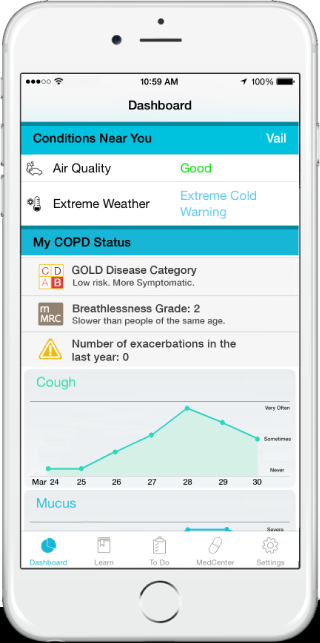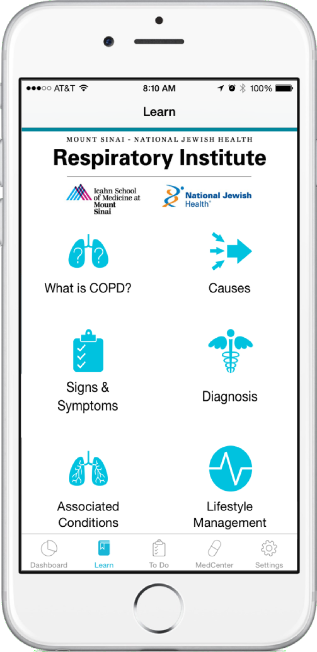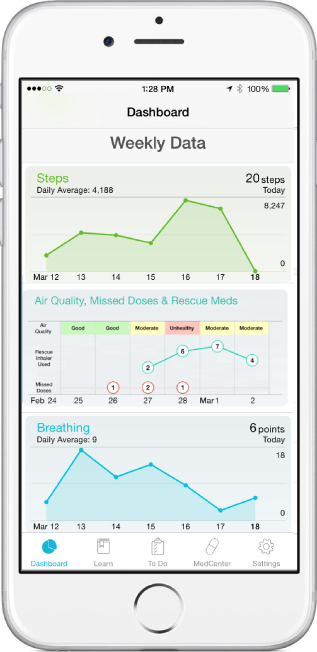San Jose, California based LifeMap Solutions, a digital therapeutics provider startup subsidiary of BioTime, Inc., has launched a pilot program for COPD Navigator, an Apple HealthKit-compliant iOS app that enables patients to monitor and manage COPD symptoms.
 The COPD Navigator app is designed to synch with a Bluetooth-enabled inhaler (LifeMap has developed its own device for the pilot) that can track medication adherence and identify potential behavioral and environmental triggers of COPD attacks. Information is presented to the user on their iOS iPhone or iPad. COPD Navigator leverages evidence-based care guidelines, behavioral science, and patient data to deliver personalized, doctor-specified interventions with the goal of achieving better outcomes at lower cost.
The COPD Navigator app is designed to synch with a Bluetooth-enabled inhaler (LifeMap has developed its own device for the pilot) that can track medication adherence and identify potential behavioral and environmental triggers of COPD attacks. Information is presented to the user on their iOS iPhone or iPad. COPD Navigator leverages evidence-based care guidelines, behavioral science, and patient data to deliver personalized, doctor-specified interventions with the goal of achieving better outcomes at lower cost.
COPD Navigator was developed in close partnership with researchers from the Icahn School of Medicine at Mount Sinai, a top-ranked academic medical center in New York City that is part of the Mount Sinai Health System, and with COPD experts from the Mount Sinai National Jewish Health Respiratory Institute. The COPD Navigator app synergizes the power of mHealth (mobile health) technology with big data analysis to provide COPD patients with an engaging, pocketable, interactive health coach. A patients doctor will specify the app’s settings and communications, and for the duration of the pilot program, Respiratory Institute physicians will work with patients equipped with the COPD Navigator iPhone app with the objective to improve their COPD self-management skills and knowledge.
This app platform provides comprehensive potential for treatment of a range of chronic diseases and enhanced opportunities for clinician engagement with patients.
Chronic Obstructive Pulmonary Disease (COPD) is the third leading cause of death in the US, affecting an estimated 24 million Americans. According to the Centers for Disease Control and Prevention, COPD ranks third (138,080) after Heart disease (597,689) and cancers (574,743). The American Lung Association notes that COPD is also a major cause of disability, and while some 12 millions Americans have a formal COPD diagnosis. An estimated 12 million more people may have the disease and go undiagnosed.
Like “cancer,” COPD is a term that actually encompasses a range of conditions, but generally speaking refers to permanent lung damage that gets worse over time. The disease can affect patients’ airways, air sacs or both. The two most prevalent forms of COPD are chronic bronchitis and emphysema. Both cause airway blockage, resulting in shortness of breath, chronic productive coughing that produces large amounts of mucus, chest tightness and/or wheezing and other symptoms. Laboring to breathe can limit activity, diminish quality of life and put extra strain on the heart.
The leading cause of COPD is Cigarette smoking. According to the National Institutes of Health, 42 percent of COPD sufferers are former smokers and 34 percent are current smokers. However the rest — a substantial 24 percent — are persons who’ve never lit a cigarette, and it is believed that exposure to other lung irritants such as air pollution, chemical fumes, or dust, especially over long terms, also may contribute to development of COPD.
In most instances COPD develops slowly, and symptoms often worsen over time limiting ability to do routine activities. Severe COPD may inhibit the patient from doing even basic activities like walking, cooking, or taking care of themselves. COPD is typically diagnosed in middle-aged or older adults, and is not contagious or communicable.
COPD is an expensive, progressive, and debilitating disease, and there is no cure as yet, and no known means of reversing damage to the airways and lungs, HOwever, its impact can be reduced through good management, making it an ideal target for an mHealth intervention. Good management includes avoiding environmental risk factors, medication adherence, good nutrition, exercise, and timely treatment of exacerbations when they occur.
[adrotate group=”3″]
“Patients can slow the progression of the disease and improve quality of life through effective self-management,” says LifeMap Solutions CEO Corey Bridges. “The promise of the mHealth revolution is to empower patients with self-management tools that are engaging and easy to use. COPD Navigator is the first product in our suite of chronic-condition apps, which fulfill that promise.”
“We’ve worked with the LifeMap team to help them design an app that leverages evidence-based care guidelines, behavioral science, and patient data to deliver personalized information with the purpose of achieving better outcomes at lower costs,” notes Charles Powell, MD, CEO of Mount Sinai National Jewish Health Respiratory Institute. “As physicians, our goals throughout product development were to help LifeMap produce a product that integrates easily into a care teams workflow and to maximize benefit to patients.”
COPD Navigator To Be The First Component of A Disease Management Platform
 The COPD Navigator app tracks patient data encompassing symptoms, medication, treatment adherence, and overall quality of life. Information is presented by the app in easy-to-understand and configurable graphs that enable patients to recognize patterns in their own health history, as well as to relay this information to their doctors. Additionally, the app helps patients avoid environmental risk factors by providing real-time alerts about local air quality and extreme weather, and delivers educational content from National Jewish Health.
The COPD Navigator app tracks patient data encompassing symptoms, medication, treatment adherence, and overall quality of life. Information is presented by the app in easy-to-understand and configurable graphs that enable patients to recognize patterns in their own health history, as well as to relay this information to their doctors. Additionally, the app helps patients avoid environmental risk factors by providing real-time alerts about local air quality and extreme weather, and delivers educational content from National Jewish Health.
The COPD Navigator app is the first component of a larger LifeMap COPD management platform which also includes Bluetooth-enabled inhaler technology and a clinician dashboard for care providers. Through its support for Apple’s HealthKit technology, COPD Navigator can accept inhaler usage information from any HealthKit-compliant, Bluetooth-enabled, smart inhaler device. In the pilot program at Mount Sinai, LifeMap Solutions is providing a smart device designed in-house, allowing the app to monitor when the patient has used their inhaler automatically. This inhaler-usage information enables the app to track the patient’s medication adherence and identify potential environmental and behavioral triggers of symptomatic exacerbations — episodes in which COPD symptoms suddenly worsen significantly. Identifying trends and individual exacerbation triggers can help patients improve their overall health quality and avoid circumstances that worsen their condition.
LifeMap says the promise of mHealth technology is that it will empower patients with self-management tools that are engaging and easy to use, and COPD Navigator is our their step toward fulfillment of that promise.
COPD Navigator supports Apple HealthKit-enabled smart inhalers and provides the care team a clinician dashboard so they can monitor patient status between visits and improve quality of care. It also allows Care Providers to achieve COPD quality-of-care goals, monitor health status of patients with HIPAA-compliant clinician dashboard, view patients records to monitor care plan adherence and symptoms over time, flag high-risk patients, set rules for events-based alerts, intervene early with the goal of reducing the risk of exacerbations, during which symptoms suddenly worsen, and send health alerts and reminders to patients.
COPD Navigator To Help Payers Reduce Cost of COPD Management
COPD costs the United States economy an estimated $50 billion annually, much of the cost resulting from COPD exacerbations.
However, expensive treatments can be avoided if patients can recognize the signs of an imminent exacerbation and take action immediately. By enabling patients and care teams to intervene earlier, COPD Navigator aims to help payers control chronic disease management costs of while improving patient quality of life.
 Real-time data from connected health devices enables better, more timely COPD management. For example, sudden decreases in patient activity can be a warning of a developing COPD exacerbation. COPD Navigator monitors a patient’s activity and logs this data for care teams to review during doctor visits. LifeMap and partners are developing algorithms to detect the onset of exacerbations and help both patients and doctors to recognize patterns meriting concern. These features will enable the patient and care team to intervene earlier to potentially prevent a COPD exacerbation.
Real-time data from connected health devices enables better, more timely COPD management. For example, sudden decreases in patient activity can be a warning of a developing COPD exacerbation. COPD Navigator monitors a patient’s activity and logs this data for care teams to review during doctor visits. LifeMap and partners are developing algorithms to detect the onset of exacerbations and help both patients and doctors to recognize patterns meriting concern. These features will enable the patient and care team to intervene earlier to potentially prevent a COPD exacerbation.
COPD Navigator can accept inhaler usage information from any HealthKit-enabled smart inhaler device, automatically detect when patient has used his/her inhaler through Bluetooth integration, determine medication adherence and identify environmental and behavioral triggers of exacerbations, and identify trends so patient or care team can take timelier action.
Harnessing Big Data Analysis to Revolutionize COPD Management
As part of LifeMap Solutions’ partnership with the Icahn School of Medicine at Mount Sinai, the developer is working with the Icahn Institute for Genomics and Multiscale Biology to provide secure, anonymized data to facilitate ongoing research into COPD, and eventually other medical conditions. The team plans to use this data to develop algorithms for predicting exacerbations, identifying effective interventions, and personalizing care plans based on demographics, lifestyle, and clinical history.
The other major component of LifeMap’s COPD platform is a clinician dashboard for care providers — a HIPAA-compliant tool that offers a view of the health status of their patient populations. Providers can also examine specific patient’s records to evaluate the patient’s care plan adherence and symptoms over time, flag high-risk patients, set rules for events-based alerts, and intervene early with the goal of reducing the risk of acute exacerbations. The clinician dashboard also enables clinicians and care providers to send health alerts and reminders to patients.
 ‘The analysis of the health outcomes and data captured from mHealth apps and devices informs the development of an expanded disease management platform,” says Eric Schadt, PhD, Chair of the Department of Genetics and Genomics Sciences, and the Jean C. and James W. Crystal Professor of Genomics at the Icahn School of Medicine, and Director of the Icahn Institute for Genomics and Multiscale Biology at Mount Sinai. “This platform provides a comprehensive solution for treatment of chronic diseases, including further opportunities for clinician engagement with patients.”
‘The analysis of the health outcomes and data captured from mHealth apps and devices informs the development of an expanded disease management platform,” says Eric Schadt, PhD, Chair of the Department of Genetics and Genomics Sciences, and the Jean C. and James W. Crystal Professor of Genomics at the Icahn School of Medicine, and Director of the Icahn Institute for Genomics and Multiscale Biology at Mount Sinai. “This platform provides a comprehensive solution for treatment of chronic diseases, including further opportunities for clinician engagement with patients.”
Dr. Schadt is an expert on the generation and integration of very large-scale sequence variation, molecular profiling and clinical data in disease populations for constructing molecular networks that define disease states and link molecular biology to physiology. He is known for calling for a shift in molecular biology toward a network-oriented view of living systems to complement the reductionist, single-gene approaches that currently dominate biology, in order to more accurately model the complexity of biological systems.
The COPD Navigator app is expected to be commercially available in the second half of 2015.
Sources:
LifeMap Solutions, Inc.
Mount Sinai Health System
Mount Sinai National Jewish Respiratory Health Institute
The Icahn School of Medicine at Mount Sinai
Centers for Disease Control and Prevention
National Institutes of Health
BioTime, Inc.
Image Credits
LifeMap Solutions, Inc.
Mount Sinai Health System
Mount Sinai National Jewish Respiratory Health Institute
The Icahn School of Medicine at Mount Sinai
